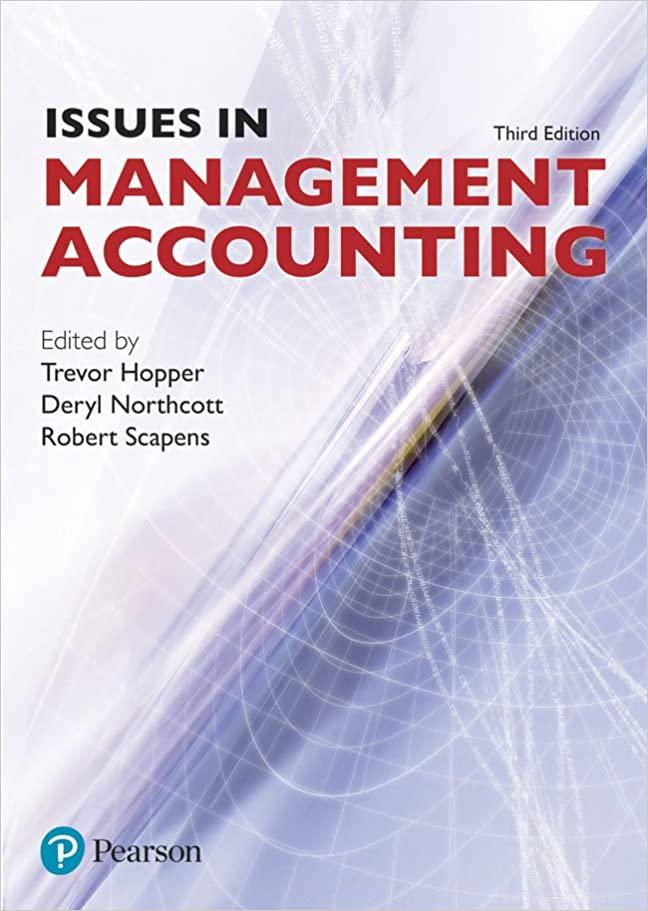Answered step by step
Verified Expert Solution
Question
1 Approved Answer
Question: What discount rate should you use in the capital budgeting analysis? W hy? As a financial analyst at Vernon Widget Manufacturers Inc. (WWM), you

Question: What discount rate should you use in the capital budgeting analysis? Why?
As a financial analyst at Vernon Widget Manufacturers Inc. (WWM), you have been asked to evaluate two capital investment alternatives submitted by the Manufacturing Department. Before beginning your analysis, you note that company policy has set the minimum desired rate of return at 12% for all proposed projects. You also learn that the corporate tax rate is 15%. The proposed capital project calls for the Manufacturing Department to fully automate a production facility using one of two different advanced robotics systems. System A willincur development costs of $900,000. System B will cost $1,100,000 to develop. Both systems will be capitalized and amortized using a CCA rate of 20%. In addition, the firm believes that Net Working Capital will rise by $45,000 at time zero and then by an additional $15,000 at the end of each year for each year that the new system is operating (except at the end of the final year of the project). This applies to both alternatives. However, all of the increase in Net Working Capital will be recovered at the end of the project. The Manufacturing Department intends to hire an outside CPA at a cost of $10,000 to advise the company on which of the two alternatives would be most effective, or if neither alternative is financially attractive. The amount paid to the CPA will be expensed at the time it is incurred. WWM owns all of its computer equipment, which has significant spare capacity. It is company policy not to rent spare computer capacity to outside users due to security concerns. As such, the company is anticipating maintaining spare computer capacity into the future. To recover a portion of the development cost, the Manufacturing Department intends to charge VWM's Purchasing Department for the use of computer time at the rate of $110 per hour for 60 hours per year for each year of the project. The amount charged will remain constant regardless of the capital investment alternative selected. If the new automated robotics system is put into use, the pre-tax cost savings each year are estimated as follows: Table 1 Year System A System B 1 $500,000 $600,000 2 $400,000 $550,000 3 $250,000 $500,000 4 $ 200,000 $350,000 5 $ 100,000 $250,000 UWNL As a financial analyst at Vernon Widget Manufacturers Inc. (WWM), you have been asked to evaluate two capital investment alternatives submitted by the Manufacturing Department. Before beginning your analysis, you note that company policy has set the minimum desired rate of return at 12% for all proposed projects. You also learn that the corporate tax rate is 15%. The proposed capital project calls for the Manufacturing Department to fully automate a production facility using one of two different advanced robotics systems. System A willincur development costs of $900,000. System B will cost $1,100,000 to develop. Both systems will be capitalized and amortized using a CCA rate of 20%. In addition, the firm believes that Net Working Capital will rise by $45,000 at time zero and then by an additional $15,000 at the end of each year for each year that the new system is operating (except at the end of the final year of the project). This applies to both alternatives. However, all of the increase in Net Working Capital will be recovered at the end of the project. The Manufacturing Department intends to hire an outside CPA at a cost of $10,000 to advise the company on which of the two alternatives would be most effective, or if neither alternative is financially attractive. The amount paid to the CPA will be expensed at the time it is incurred. WWM owns all of its computer equipment, which has significant spare capacity. It is company policy not to rent spare computer capacity to outside users due to security concerns. As such, the company is anticipating maintaining spare computer capacity into the future. To recover a portion of the development cost, the Manufacturing Department intends to charge VWM's Purchasing Department for the use of computer time at the rate of $110 per hour for 60 hours per year for each year of the project. The amount charged will remain constant regardless of the capital investment alternative selected. If the new automated robotics system is put into use, the pre-tax cost savings each year are estimated as follows: Table 1 Year System A System B 1 $500,000 $600,000 2 $400,000 $550,000 3 $250,000 $500,000 4 $ 200,000 $350,000 5 $ 100,000 $250,000 UWNLStep by Step Solution
There are 3 Steps involved in it
Step: 1

Get Instant Access to Expert-Tailored Solutions
See step-by-step solutions with expert insights and AI powered tools for academic success
Step: 2

Step: 3

Ace Your Homework with AI
Get the answers you need in no time with our AI-driven, step-by-step assistance
Get Started


